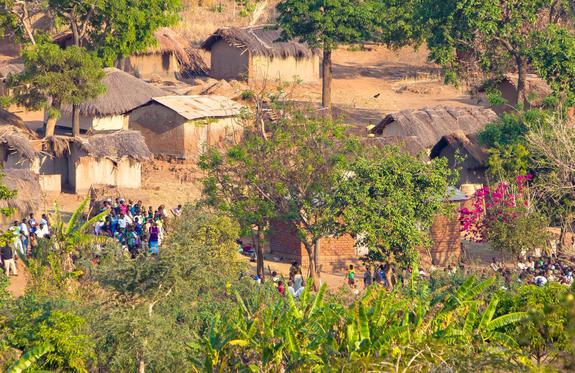Dubbed the 'Warm Heart of Africa' for its good-natured charm, the tiny, landlocked country of Malawi in southeastern Africa is a famously hospitable little nation brimming with touristic abundance. Its exuberant landscape is a breathtaking natural kaleidoscope of verdant countryside, sweeping plateaux, soaring highlands, and river valleys. Malawi's share of the vast Great Rift Valley encompasses the country's must-see eco-destination, the emblematic Lake Malawi, several national parks and game reserves, while the Central African Plateau's undulating terrain is defined by a series of dramatic escarpments, punctuated by lakes, dramatic hills and dense forests. A wealth of outdoor activities is open to outdoor enthusiasts, including hiking, swimming, scuba diving, snorkelling, water skiing, sailing, kayaking, parasailing and boating. Game viewing at the reserves offers a chance to see crocodiles, lions, elephants, hippos and leopards. For the more culturally curious, browse the many bustling markets, visit traditional villages and dig into the treasure trove of the country's history at The Society of Malawi in Blantyre.

In 1975 Lilongwe took over from Zomba as Malawi’s capital. The Old Town, with its exciting street and walled markets, has still maintained the appearance of a traditional African settlement, while the new city is one of the better modern African cities, laid out in a reasonably spacious way. An interesting attraction is Kamuzu Academy, founded by the country’s first President Dr Hastings Banda and sometimes referred to as "the Eton of Africa".

The Liwonde National Park lies south of Lake Malawi - lush and wild with the best wildife safaris on offer in Malawi. This is largely because of the Shire River, (pronounced Shiree) which drains Lake Malawi, forms its western boundary and acts as a magnet for wildlife. Broad and languid, it is alternatively fringed by riverine forest, Borassus palms and wide floodplains, stretching to 3km wide in parts. Liwonde park offers a lush diversity of habitats. Relatively dry mopane woodlands cover the eastern half of the park - interspersed with candelabra trees - while patches of miombo woodland occur in the south. Palm savanna and numerous baobabs line the extensive floodplains of the Shire River.
Arriving by river boat is the best way to see the beauty of this magnificent park. With one of the densest populations of hippo in Africa, and a riverbank heavy with huge sun bathing crocodiles, the wide and scenic Shire river is a vital life source for the park's animals in the dry season. The grass-covered floodplains attract large breeding herds of elephant, magnificent and rare sable antelope as well as impala, reedbuck, waterbuck & warthog amongst others. The park is also home to lion, the elusive leopard as well as buffalo, kudu and impala which inhabit the woodlands beyond the floodplain. Liwonde Park has a smaller sanctuary within which is a breeding project with a small number of black rhino.
Birdlife is prolific in Liwonde with over 380 recorded species offering probably the best year-round birding in Southern Africa and 'specials' include the rare Pel's fishing owl, white-backed night heron, Böhm's bee-eater and Lilian's lovebird.
Safaris are conducted in open vehicles (on day and night drives), by foot and by boat. There is also an opportunity to track black rhino on foot which is an exciting addition. We recommend combining a couple of nights on safari in Liwonde with another safari destination such as the South Luangwa National Park in Zambia, Majete Game Reserve also in the south or the contrasting Nyika plateau in the north.

Lake Malawi is the stellar attraction of Malawi, enriching every aspect of its life. It is a vast expanse of bright blue water, 600km long and up to 80km wide, constituting some 20% of the surface area of Malawi. The lakeshore comprises miles of palm-fringed sandy beaches, rounded granite boulders and romantic wooded islands, with the call of the African fish eagle ever present. A few small beach lodges are dotted along the shore line interspersed with picturesque fishing villages blending into the natural vegetation. Everywhere people smile and seem delighted to see you.
Over 2,000 species of fish occur in the crystal-clear waters of Lake Malawi, including the colourful endemic cichlids that are easily spotted when snorkelling. At 700m it is incredibly deep its lowest point is more than 200m below sea level. Other watery holiday activities on Lake Malawi include scuba diving, kayaking, sailing and just chilling out by the lapping waters. Visits to local villages are also on offer from some of the beach lodges.
The beatuiful mountainous terrain surrounding much of the lake does not make for productive farming. So the lake is an integral part of the Malawi economy. (Fish such as chambo and kapenta make up the main protein source for people, estimated to be 70% of the protein diet for the people of Malawi.) Fishing at night using lights and paddle bangs to attract the fish is a common sight. Sometimes the lake is charmingly lit with the tiny lights of the many fishermen.
Although in Mozambican waters Likoma Island is a Malawian island. Likoma is typically reached by daily charter flights from Lilongwe. The island is famous for its cathedral which is as big as Winchester Cathedral. The vast building, which was begun in 1903, has numerous interesting stained glass and carved soapstone features.
In the South of Lake Malawi, Cape Maclear is one of its premier destinations surrounded by its Marine Park. It is renowned for both its sunsets and its snorkelling.





